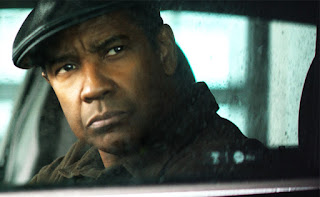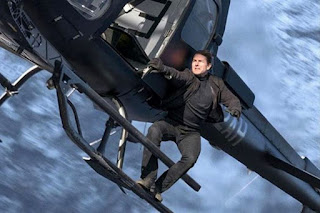Denzel, Dwayne and basic movies
There are those who think film should be art. But it’s commerce,
and even very good actors will at times bend to commercial demands. After all,
if you have generated a following by appearing in big dumb action movies or
throwaway comedies, then you may have the clout to make an occasional movie you
care about. And I can’t really object to the commercial-movie strategy. I like
commercial movies, even some badly made ones, if they provide a measure of
escape. Put it another way: I’ve seen all the “Fast & Furious” movies,
voluntarily.
I bring this up because I saw Dwayne Johnson’s “Skyscraper”
not long ago, and Denzel Washington’s “The Equalizer 2” today. Each movie is
aimed squarely at the commercial moviegoer, and especially the fans of previous
box-office-friendly work by these two actors. (Both allow for action-heavy
trailers, although the action element of “The Equalizer 2” has been oversold in
its ads.) Both are largely derivative. But that does not mean they’re
completely unsatisfying, and both try to work some small changes in their familiar
frameworks.
“The Equalizer 2” – the second film inspired by the 1980s TV
series – again finds Washington as man who “equalizes” the odds people face
when confronted by an overwhelming foe; the opening sequence has him rescuing a
little girl who has been taken from her mother, and his work as a Lyft driver
puts him in contact with others in need. (How he gets paid is left
unexplained.) But he is also a man who has cut himself from almost all human contact;
he has one friend, played by Melissa Leo, from his old days in the spy trade. Instead,
he drives his customers, among them an elderly man (Orson Bean, whom many of you remember as a TV wit decades ago) who is trying
to deal with a loss from his distant past, much the way Washington still quietly
grieves the death of his wife. And he reads – Richard Wright is on his
bookshelf, and Ta-Nehisi Coates’s “Between the World and Me” shows up more than
once.
But then he begins to mentor a young man in his neighborhood,
and Leo is killed in Belgium, sending Washington in search of those responsible.
It’s a course that includes betrayal, a massive shootout in the middle of a
shore-community’s storm, and more than a little philosophizing. Until the
ending, which goes on too long, it is well anchored in tension and in the quiet
force Washington brings to his performance. And the philosophical discussions
are meant to give his character, and the film, more weight. It’s more than a
little significant that Washington asks his young charge to read Coates’s book,
for instance.
The plot of the movie is wanting, with one twist painfully
obvious and the climactic fight rather too long. Taken as a standard suspense
film with an entertaining character, it adequately filled a couple of hours on
a Saturday afternoon. It’s no more than that, but sometimes that’s all you
need.
“Skyscraper” is, on its surface, is also a pretty standard
film, repeatedly inviting comparisons to “Die Hard,” along with bits of “The Towering
Inferno” and a major set piece recalling “The Lady from Shanghai.” Or, for
younger moviegoers, “John Wick 2.”
This finds Johnson as
a security expert checking out the world’s tallest building, only to run afoul
of bad guys who set the building ablaze as part of a robbery scheme that –
well, you don’t need to know any more than that. Adding to Johnson’s dilemma is
the presence in the building of his wife (Neve Campbell) and two children, so
the jeopardy is as widespread as the building is enormous. Cue gunplay, fires,
fights, a perilous climb along the side of the building, skeptical law
enforcement, and so on – all efficiently presented, and not a disappointment
when I was craving some big dumb action.
But the box-office returns so far have been disappointing by
Johnson’s usual standards. It may be that it looked a little too much like “Die
Hard,” or that it came too close on the heels of Johnson’s last action epic, “Rampage”
(now on disc), which at least looked somewhat different and contained a line, “Of
course the wolf flies,” which my wife had to hear me repeat ad nauseam.
Still, people who go to “Skyscraper” can congratulate
themselves because of some of the smaller flourishes. As I said in a previous
post about women and power onscreen, Campbell’s character is designed as more
than a helpmate; she kicks some ass on her own and (spoiler) saves the day at
the end of the film. (Johnson appears very comfortable letting other people
finish off his adventures, whether it’s Campbell in “Skyscraper” or a gigantic
ape in “Rampage.”)
In addition, Johnson in “Skyscraper” is a slightly different
action hero – one who has lost part of a leg in a disastrous hostage-rescue. It’s
commendable to see a person with a disability at the center of a thriller like
this. There have been some complaints that an actor with a real disability
should have played Johnson’s role; he could have taken a supporting role to
provide his marquee value. (Contrast this with Millicent Simmonds, a deaf
actress hired to play the deaf character in “A Quiet Place.”) I understand the
complaint but question whether the movie could have been made without someone
of Johnson’s box-office standing at its center. And Johnson appears to like his
seemingly light movies to still have a little bulk – talk about bullying in “Central
Intelligence,” or social perceptions on “Jumanji,” or emphasizing the human
side of apes in “Rampage.”
At the same time, I keep waiting for Johnson to make the
next big move as an actor. Yes, we know he can do action. And he has proven
adept at comedy and warm-hearted character work, particular in “Central
Intelligence” with Kevin Hart. That’s OK, I suppose, but I think he could do
more. His work on HBO's "Ballers" has hinted at that, at least. Could he be Denzel Washington? Heck, not many people can. But he could step up, especially when moviegoers may have seen enough of his action
moves.
What then do we take away from all this? Yes, sometimes we can
be OK with movies that have modest ambitions. Beyond that, though, if we look between
the fires and explosions and monsters, we may find little pleasures – reasons to
think in the middle of our larger relaxation.



Comments
Post a Comment